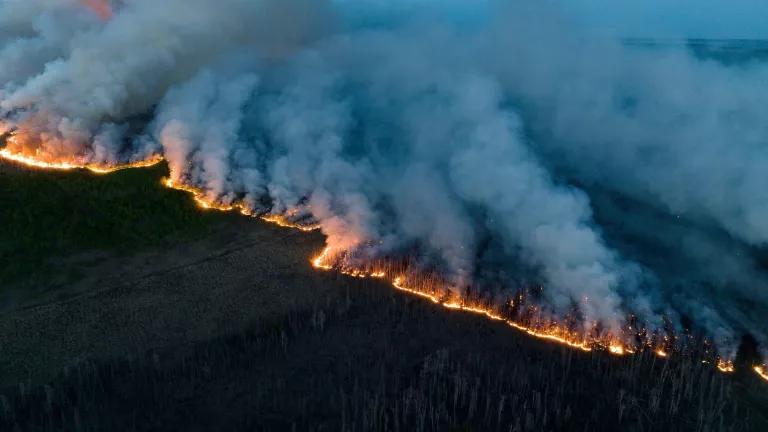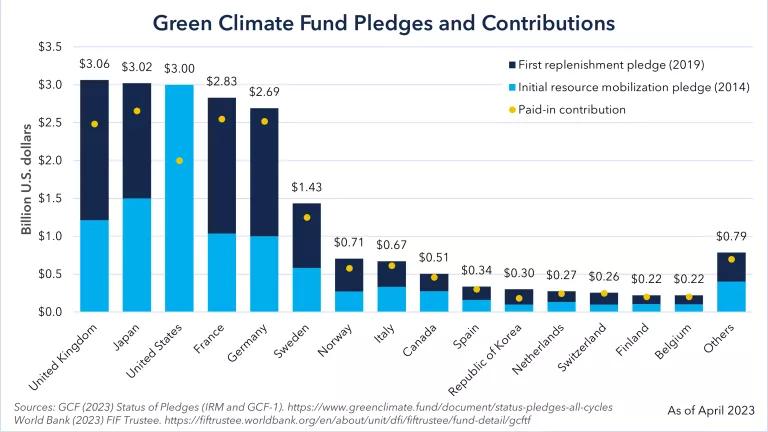It’s Time for Washington to Act on Climate
As Senate Democrats show unity in the call for climate action, it’s time for others to follow their lead to tackle the greatest environmental crisis we face today.

A climate resolution calling for immediate action is cosponsored by all 47 Senate Democrats, including (from left) Senate Minority Leader Senator Chuck Schumer of New York and Senator Patrick Leahy of Vermont.
Andrew Harnik/Associated Press
As Senate Democrats show unity in the call for climate action, it’s time for others to follow their lead to tackle the greatest environmental crisis we face today.
The forces of science and the voices of the American people are coalescing like never before around the urgency to confront climate change. It’s time for members of Congress, from both parties, to forge a bipartisan consensus for action. A short resolution introduced in the Senate Thursday, February 28, 2019, offers a way to open the conversation.
The nonbinding resolution states, in full, that “climate change is real; human activity during the last century is the dominant cause of the crisis; and the United States and Congress should take immediate action to address the challenge of climate change.”
Yes, that’s it. We have an urgent crisis on our hands, says the resolution; let’s roll up our sleeves and fix this. If ever there was an opportunity for Republicans and Democrats alike to rally around the imperative to confront the climate crisis while there’s still time, this is it.
Senate Democrats unanimously endorsed the resolution, sending a resounding message of unity around the need for urgent climate action, amid pledges to work toward a longer-term and more comprehensive package of measures comprising a Green New Deal.
“Now, in an ideal world, every single Republican senator would sign on to our climate change resolution, because there should be nothing controversial about it at all,” Senate Minority Leader Chuck Schumer said in remarks on the Senate floor. “It’s the first step to moving something in a positive direction.”
One prominent Republican, the former Ohio governor John Kasich, said this week that climate change is a threat we must address. He called on other Republicans to engage in a conversation about solutions. “Let’s step up,” said Kasich. “You can’t just be a science denier.”
There was a hopeful sign, also, in the choice that House Minority Leader Kevin McCarthy of California made for ranking Republican on the new Select Committee on the Climate Crisis. McCarthy picked Representative Garret Graves, a Louisiana Republican steeped in both the energy industry and the high and rising price his state is paying for climate change.
Graves has been criticized in his own state for his poor environmental record overall. He is, though, familiar with the rising costs and growing dangers climate change is imposing on our people. Under Louisiana’s former governor Bobby Jindal, Graves served as chairman of the state’s Coastal Protection and Restoration Authority, where he saw firsthand the toll taken by hurricanes, rising seas, and other dangers made worse by climate change.
The other Republican members of the select committee are Morgan Griffith of Virginia, Buddy Carter of Georgia, Gary Palmer of Alabama, Carol Miller of West Virginia, and Kelly Armstrong of North Dakota. The committee is chaired by Democratic Representative Kathy Castor of Florida, a longtime champion of climate action.
The measured but welcome signs of hope don’t conceal the political challenge ahead. No sooner was the Senate climate resolution introduced, in fact, than Senate Republicans rushed to confirm former coal lobbyist Andrew Wheeler as administrator of the U.S. Environmental Protection Agency, in a 52-47 party-line vote. No Democrats voted for Wheeler, and every Republican voted for him, except one: Senator Susan Collins of Maine. Democratic Senator Kyrsten Sinema of Arizona did not vote.
The Trump administration, meanwhile, continues to wage its all-out attack on the country’s climate gains, while pushing policies to promote the fossil fuel use that’s driving climate disruption.
Dismissing the findings of the National Climate Assessment last fall—the work of climate experts in 13 federal agencies—President Trump said of the threat in an interview with the Washington Post, “I don’t see it,” adding, “I have a gut, and my gut tells me more sometimes than anybody else’s brain can ever tell me.”
For those who aren’t persuaded by Trump’s gut instincts, he’s poised to create a White House panel to try to rewrite climate science to fit his pro-polluter agenda. An internal memo lays out the plan for Trump to create, by executive order, something called the Presidential Committee on Climate Security, charged with assessing the “scientific accuracy” of U.S. government reports on climate change and the national security implications it has raised.
The memo refers any questions about the idea to William Happer, a widely known skeptic of consensus climate science who is a member of the White House National Security Council. As described in the memo, Trump’s fake climate committee would operate as part of the National Security Council, where the panel could do much of its work in secret under a false cloak of national security work.
Of course, hundreds of trained scientists subject the U.S. government climate findings to the rigors of peer review and professional oversight every day. It happens at places like the National Oceanic and Atmospheric Administration, the gold standard for climate data worldwide; the National Academy of Sciences, established by Congress during the Civil War to tell us the bedrock truth about what’s happening to our world; and the National Aeronautics and Space Administration, the people who put a man on the moon.
The best of this work is compiled every four years in the National Climate Assessment.
The most recent such assessment was published in November, and it concluded that burning coal, oil, and natural gas is changing the global climate faster than it has changed at any other time in modern human history, threatening our national security, our economic prosperity, and our children’s future. All this will get worse, perhaps unimaginably so, the report concludes, unless we move swiftly and deliberately to shift to cleaner, smarter ways to power our future while there’s still time to act.
The climate science is accurate. Trump rejects it, though, because it runs counter to his efforts to tie our future to the dirty fossil fuels of the past. So he wants to create an in-house propaganda shop to manufacture ignorance and perpetuate falsehood in the name of the American people.
“This is beyond willful ignorance,” Schumer said in a February 26 statement, vowing to introduce legislation to defund what he called Trump’s “Orwellian ministry of truth,” should the White House move forward with the plan. “This is the intentional, deliberate sowing of disinformation about climate science—by our own government,” said Schumer. “This cannot stand.”
It’s long past time for leaders from both parties to rally around the urgent need for climate action to avert the worst impacts of a full-blown climate catastrophe. The American people have a right to expect meaningful action, both from the White House and from Capitol Hill.
It’s long past time for leaders from both parties to rally around the urgent need for climate action to avert the worst impacts of a full-blown climate catastrophe.
“It is our entire planet that’s at risk,” Democratic Senator Jeff Merkley of Oregon said Thursday in remarks on the Senate floor. “So any member of this chamber that is not coming forward to help figure out how to address that is guilty of vast malpractice, legislative malpractice, moral malpractice, incompetence. Because that’s what a legislature is about, the big problems that we face. We come together. We don’t ignore them. We wrestle with the best way to take them on. And that’s what this conversation is about.”



